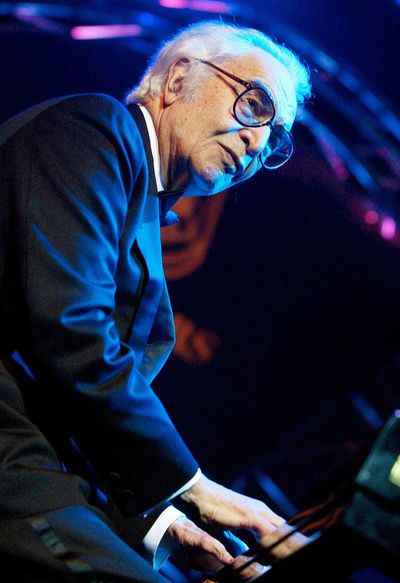Jazz legend Dave Brubeck, 91, dies
He was innovator with popular touch

HARTFORD, Conn. – Jazz composer and pianist Dave Brubeck, whose pioneering style in pieces such as “Take Five” caught listeners’ ears with exotic, challenging rhythms, has died. He was 91.
Brubeck, who lived in Wilton, Conn., died Wednesday at Norwalk Hospital of heart failure after being stricken while on his way to a cardiology appointment with his son Darius. Brubeck would have turned 92 today.
Brubeck had a career that spanned almost all American jazz since World War II. He formed The Dave Brubeck Quartet in 1951 and was the first modern jazz musician to be pictured on the cover of Time magazine – on Nov. 8, 1954 – and he helped define the swinging, smoky rhythms of 1950s and ’60s club jazz.
George Wein, a jazz pianist and founder of the Newport Jazz Festival, had known Brubeck since he first worked in Wein’s club in Boston in 1952.
“No one else played like Dave Brubeck,” he said. “No one had the approach to the music that he did. That approach communicated.”
Brubeck “represented the best that we can have in jazz,” he added. “The quality of his persona helped every other jazz musician.”
The seminal album “Time Out,” released by the quartet in 1959, was the first ever million-selling jazz LP, and is still among the best-selling jazz albums of all time. It opens with “Blue Rondo a la Turk” in 9/8 time – nine beats to the measure instead of the customary two, three or four beats.
A piano-and-saxophone whirlwind based loosely on a Mozart piece, “Blue Rondo” eventually intercuts between Brubeck’s piano and a more traditional 4/4 jazz rhythm.
The album also features “Take Five” – in 5/4 time – which became the Quartet’s signature theme and even made the Billboard singles chart in 1961. It was composed by Brubeck’s longtime saxophonist, Paul Desmond.
“When you start out with goals – mine were to play polytonally and polyrhythmically – you never exhaust that,” Brubeck told the Associated Press in 1995. “I started doing that in the 1940s. It’s still a challenge to discover what can be done with just those two elements.”
In later years Brubeck composed music for operas, ballet, even a contemporary Mass.
In 2006, the University of Notre Dame gave Brubeck its Laetare Medal, awarded each year to a Roman Catholic “whose genius has ennobled the arts and sciences, illustrated the ideals of the church and enriched the heritage of humanity.”
In 1996, he won a lifetime achievement award from the Grammys and in 2009 he was a Kennedy Center Honors recipient.
Brubeck told the AP the Kennedy Center award would have delighted his late mother, Elizabeth Ivey Brubeck, a classical pianist who was initially disappointed by her youngest son’s interest in jazz. (He added that she had lived long enough to come to appreciate his music.)
Numerous jazz musicians were scheduled to participate in a birthday concert in Brubeck’s honor that had been scheduled today in Waterbury, Conn. The show will go on as a tribute concert.
Darius Brubeck, an acclaimed pianist, was among those scheduled to perform along with saxophonist Richie Cannata, and Bernie Williams, former New York Yankees star and a jazz guitarist.
“What he brought was a new meter to jazz,” said Cannata. “I was probably in high school or elementary school when I first heard that 5/4 feel. I said, ‘Wow, what is that?’ I was totally influenced. It made me stand up and pay attention to another whole feel of music.”